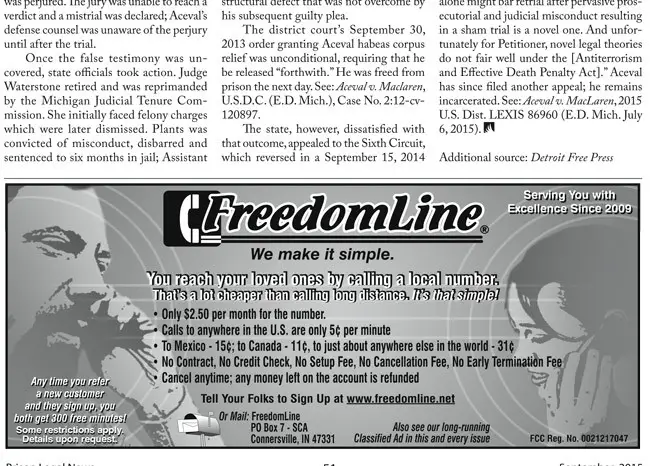
Inmates won’t be reading a newspaper banned by Florida corrections officials anytime soon, due to a decision by a Tallahassee federal judge who said the publication’s advertisements pose a threat to security.
But in a ruling last week, U.S. District Judge Mark E. Walker also handed a partial victory to Prison Legal News, finding that Department of Corrections officials violated the publication’s constitutional due-process rights by failing to provide notification when copies of the monthly periodical were impounded.
The wrangling over Prison Legal News, available to prisoners in every other state but Florida, has dragged on for over a decade. Corrections officials have confiscated the publications for six years.
“This is not the parties’ first rodeo…,” Walker noted in a 64-page ruling issued Thursday.
The department changed its rules regarding censorship five times since the onset of the battle with Prison Legal News, which filed a lawsuit against the agency in 2004. The case was dismissed the following year after a judge ruled it moot because the department had promised to deliver the publication to inmates.
But after adopting a rule concerning “Admissible Reading Material” in 2009, the agency again began impounding the newsprint publication. The rule banned publications that contain certain advertisements — for three-way telephone calls, the purchase of products or services in exchange for postage stamps, pen pal services and conducting a business while incarcerated — if the ads are “the focus of, rather than being incidental to” the publication. The rule also bans materials if the advertising for the prohibited services “is prominent or prevalent throughout the publication.”
Lawyers for the Lake Worth-based publication argued that the censorship was a violation of its First Amendment rights. Various media organizations, including the Florida Press Association, filed a friend-of-the-court brief supporting Prison Legal News’ lawsuit.
Prison Legal News accused prison officials of targeting the publication — which has about 7,000 subscribers nationwide, including more than 200 in Florida, many of whom are incarcerated — because it included articles critical of the corrections department.
The department could provide no evidence of any adverse incidents caused by the advertisements, lawyers for the publication wrote in 2013.
Prison Legal News offers “political and social commentary about the prison system that enjoys the highest protection under the First Amendment,” the lawyers wrote. “With such fundamental rights at stake and the evidence of potential harm so flimsy, this court should conclude that the FDOC’s actions have simply gone too far.”
Lawyers for the media organizations argued that the censorship could have a chilling effect on newspapers distributed in prisons, which also carry advertisements for services or products banned behind bars, such as guns or alcohol.
But Walker disagreed “because the censorship reasonably relates to public safety and prison security.”
And, he wrote, the “advertisements compromise security because they convert a publication into a ‘one-stop shop’—to borrow from the FDOC’s expert—for dangerous services.”
Reached by telephone on Tuesday, Prison Legal News founder and editor Paul Wright said he intends to appeal Walker’s ruling.
“For a department that routinely murders prisoners in its care through brutality and through medical neglect, it should come as no surprise that they don’t respect the First Amendment any more than they respect the Eighth,” Wright said.
The corrections department “is currently reviewing the ruling and discussing the outcome with its counsel,” agency spokesman McKinley Lewis said in an email.
While rejecting the First Amendment argument, Walker praised the value of the publication, which he said informs inmates of their rights and about unconstitutional prison practices.
“With this knowledge, inmates become another check to government encroachment on constitutional rights. This in turn helps prison administrators correct insidious practices, ensuring long-term stability. Everyone ultimately benefits when knowledge grows from more to more,” he wrote.
Also, Walker said that it was “troubling” that Florida is the only state in the country that prohibits the publication. New York prison officials, who once banned the newspaper, now attach a notice saying that the advertised services are prohibited, but that may not work for Florida, Walker noted.
But what Walker found “most disconcerting” was the vagueness of Florida’s censorship rule revealed during a January trial.
“None of the witnesses at trial were able to articulate any reasonably specific guidelines to determining when advertisements were ‘prominent or prevalent.’ Some considered whether font was large and bolded to determine prominence. Others looked to the size of the advertisements. For prevalence, no one could identify a cutoff,” he wrote.
–Dara Kam, News Service of Florida
![]()





























Leave a Reply